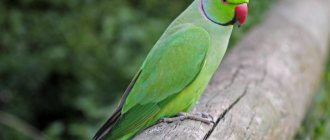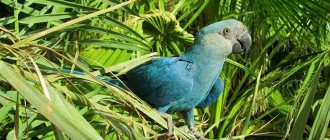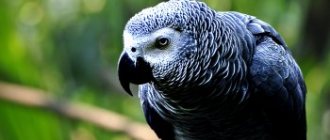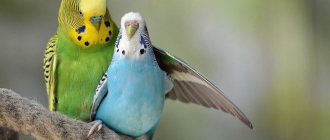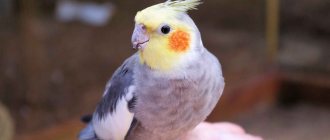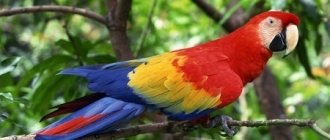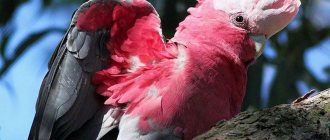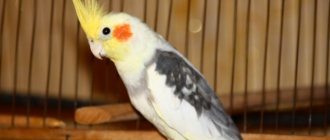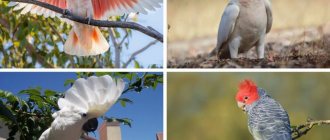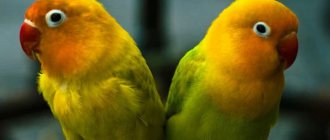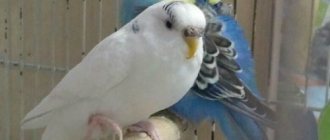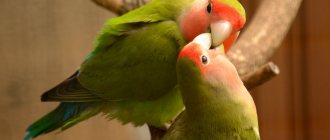Owners of strange parrots are often interested in their characteristics: living in everyday life, food, possible difficulties. In particular, breeders are concerned about the question of how long macaws live. The lifespan of these exotic birds is affected not only by various diseases, but also by the level of care of the owner. Let's talk about the longevity of wild and domesticated macaws, the causes of early death, and also get acquainted with long-lived representatives of the genus.
How long do macaws live in their native environment?
Professional naturalists have an assumption that large parrots live longer in the wild than humans. Natural instinct helps to protect yourself from danger. To survive, a parrot needs caution, as well as luck and luck.
What can cause a free macaw to die prematurely?
- viral epidemics;
- drought and crop failure;
- habitat loss due to development;
- drainage of water bodies;
- injuries caused by predators;
- Forest fires;
- poisoning.
Attention! Spectacular birds often become victims of poachers. Wanting to get rich by selling rare chicks, dishonest people set traps in which the birds die when they become entangled.
It is impossible to answer with certainty the question of how many years macaws live in freedom. Ornithologists, observing wild birds, selectively catch them, band them and release them. Long-term tracking of individual individuals is the only chance to determine the age of a parrot in nature. At the moment, it is known that the lifespan of different representatives of the macaw genus is from 30 to 40 years.
Health and illness
As practice has shown, macaws that receive proper care feel great and very rarely get sick. Among the diseases most common in these birds are the following: feather pulling, beak deformation, allergies, lipomas, papillomas, fungal infections, viral diseases.
As a rule, no disease goes unnoticed, and there are a number of symptoms that should definitely be a warning sign for the owner.
You should be concerned if your bird:
- mood swings;
- loss of appetite;
- eyes water;
- feathers ruffled;
- apathy;
- uneven breathing;
- excessive saliva production;
- any changes in stool.
A sick bird should be placed in a warm place without drafts, with water and food placed in close proximity to it.
Do not put off visiting the veterinarian; diseases in birds progress very quickly. A day of delay could cost your beloved friend his life.
Life expectancy next to a person
Ornamental birds for breeding and keeping in everyday life are no longer taken from nature. This is especially true for rare species, which include the macaw. The vast majority of exotic birds are bred in nurseries. Such birds do not have strong instincts; they will never adapt to wild conditions. Nobody teaches them to survive and avoid dangers.
One can only make assumptions about the life expectancy of a domestic macaw parrot, based on information from open sources: published articles by ornithologists, observations of breeders, discussions on thematic forums. Each specific bird can die of old age, or it can die in its prime for various reasons. But as a rule, the life expectancy of a macaw at home reaches four decades, although there were also those who lived next to a person for more than half a century.
Lifespan
In favorable conditions and with good care, the broken life lived for a long time. It is an officially stated fact that at the Antwerp Zoo, Kea's macaw, the record holder for the oldest, barely lived to be half a century old. In the wild, a parrot's lifespan is shorter because it is affected by many different factors, from food availability to natural predators. In the wild, parrots rarely live longer than 15 years.
There is no exact information about the macaw's lifespan, but scientists estimate that these birds can live up to 75 years. As in other cases, there are exceptions to the rules.
Among lovers of this type of bird, there are legends about long-lived parrots who lived for about a hundred years, but this information has not been recorded anywhere.
Life expectancy criteria
For a pet macaw to live as long as possible, it needs comfort. The combination of the individual characteristics of a bird with proper care and care is the basis for longevity.
Environment and other parameters that determine the lifespan of a macaw parrot:
- Genetics. Poor heredity is one of the reasons why a bird does not live long. This is possible if the breeder allows inbreeding or other breeding errors. The offspring turns out sick, with weak immunity and lack of love for life. These chicks are often sad and prone to illness.
- Activity. To maintain good health, a parrot must move a lot: play, fly, and do avian “physical education.” To prevent obesity, depression and self-plucking, the bird needs to walk around the apartment every day. During exercise, the macaw should not be left alone, unattended. It is best to use this watch for communication and training.
- Microclimate. Indicators such as temperature, humidity, illumination must be maintained within acceptable limits. A macaw's lifespan may be shortened if the air parameters are not suitable for it. 20 - 25 degrees Celsius, 50 - 60% relative humidity, 14 hours of daylight, clean air - these are all conditions for a healthy lifestyle . Additionally, you need to ensure compliance with the day and night regime, ventilate the room and avoid drafts.
- Nutrition. A balanced diet consisting of dry mixtures, succulent food and animal protein. When kept in captivity, the macaw, like other parrots, needs high-quality and varied food. Food prepared for people is prohibited: fried, smoked, salted and spicy. It is simply unacceptable to offer dishes from a common table to a parrot, otherwise you can harm the pet and shorten its lifespan.
- Cell. Large birds require spacious housing. The macaw reaches sizes of 80–100 cm, so it is best to equip an enclosure for it. Near the abode of a feathered pet there should be no noisy household appliances, which have a bad effect on health.
Worth thinking about! Often, owners allocate a large ward a room for sole use. When this is not possible, consider getting a giant parrot. Putting a freedom-loving bird in a cramped cage and depriving it of the ability to fly is inhumane.
Talkative birds like macaws need to communicate a lot. When kept alone, you should devote a lot of time to the bird, otherwise it will wither away from boredom. A busy or taciturn owner, without meaning to, shortens the bird's eyelid.
What influences?
In their natural habitat, wild hornbills live in tropical forests, choosing the crowns of tall trees as their nesting sites. These birds prefer plant foods consisting of nuts, fruits and young shoots. Parrots in large flocks can cause significant damage to agricultural plantations, forcing farmers to hunt these beautiful birds. The reasons that significantly affect the lifespan of wild animals are listed below.
At home, the pet is carefully looked after, so it does not need to look for food, protect itself from predators, or look for a place to nest. If the owner correctly approaches the maintenance and safety of the bird, the macaw can live safely for more than half a century. To do this, follow these steps:
Causes of premature death
In nature, a parrot faces many dangers, and it does not always depend on it whether the macaw will survive or die. But in captivity, responsibility for the life of the ward lies entirely with the owner. Not everyone copes with the burden of worries, and more often, due to inexperience, they make irreparable mistakes.
Why does a pet parrot die prematurely? Here are the most common reasons:
- dangerous diseases (ornithosis, salmonellosis, endocrine disorders);
- inhalation of toxic fumes (non-stick coating, aerosols, tobacco);
- poisoning (household chemicals, indoor flowers);
- burns from a hot stove or open fire;
- suffocation after swallowing a small object;
- electric shock (through a broken electrical wire);
- stress (cat or dog attack);
- severe injuries to the beak, limbs, wings;
- poor care, unsanitary conditions;
- flying out the window.
The list can go on for a long time. It would seem that the bird is in the apartment as if behind a stone wall. But, as in nature, at home the parrot’s main enemy is, again, man. Most often, it is the owner who unintentionally becomes the executioner for his pet.
Bird food
As we have already said, how long a macaw parrot lives directly depends on what, how and when it eats. The main food of these large birds is grain. Birds eat little of it, but it is from it that they get slow carbohydrates, which allow them to move intensively and not get tired. Greens, vegetables and fruits provide birds with vitamins, which are very important for the full development of the body and maintaining its health. Mineral mixtures and special vitamin supplements allow you to replenish the supply of nutrients if the bird does not receive enough minerals and vitamins from food.
About long-livers among macaws
Natural scientists, tracking statistics, have identified long-livers among domesticated macaws in several parts of the world:
- The first place is occupied by the green-winged macaw from the Whipsnade Nature Reserve in England - it lived for 50 years;
- Lesser Soldier's Macaw from London - 46 years old;
- Copenhagen Zoo's blue-and-yellow macaw has delighted visitors for 43 years;
- hyacinth macaw from Austria, lived in the zoo for 38 years.
This is a fact: data on the birth and death of long-lived parrots are included in the relevant documents and stored in archives.
Where do they live?
You can meet the Blue-and-yellow parrot in the following Latin American countries:
- Panama
- Paraguay
- Bolivia
- Ecuador
- Guyana
- Peru
- Suriname.
Currently, wild populations of these birds have noticeably decreased in Brazil, Venezuela, and Colombia.
In Trinidad, this species has completely disappeared.
How old is a parrot by human standards?
The chicks grow quickly, and in infancy their age does not correlate with the age of human children. Having survived the first molt, the chick gradually matures sexually. The macaw parrot comes in several varieties; on average, sexual maturity occurs between 3 and 7 years. The beginning of the first clutch coincides with human twenty years. Further, the bird develops less actively, and at the equator of life it is equivalent to a mature forty-year-old person.
Bright, showy macaws have a long life expectancy. They often live to an advanced age. Being very old people, they retain their beauty and physical shape. With good care and properly organized space, the macaw lives side by side with people for three decades or more.
Appearance
| Name and classification | Blue-and-yellow macaw Ara ararauna |
| Photo | |
| Length | 0.76—0.95 m |
| Wings | The span is from 1.04 to 1.14 m |
| Tail | 0.52 m |
| Adult weight | 0.9-1.3 kg |
| Color | A combination of blue (back, wings), blue (back, wings, tail), yellow (neck, belly, wings, tail), green (head), black (throat) colors. |
| Beak | Strong, curved to the bottom, black in color. |
| Eyes | Straw-yellow (in young animals – brown with a gray tint). |
| Paws | Brown-black |
| Sex differences | Females, unlike males, have a wider head and a narrower beak. |
| Peculiarities | Unfeathered cheeks and areas around the eyes with black stripes of small feathers. |
| Conservation status | The species is under the control of the CITES convention (Appendix II) |
